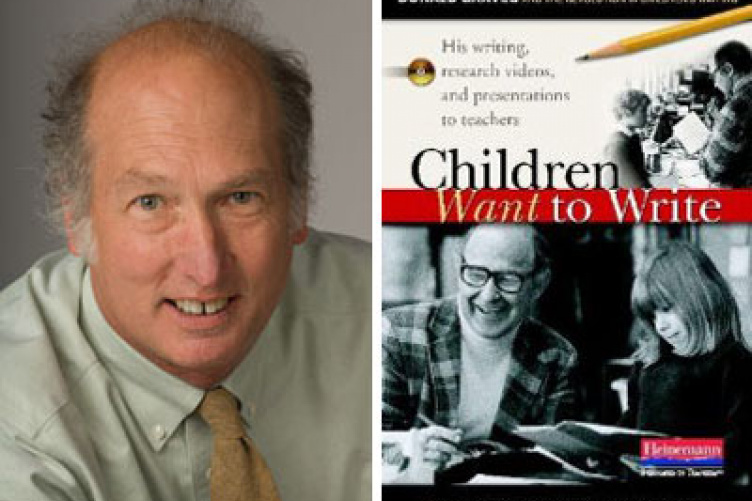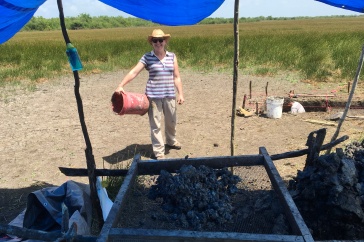
Thomas Newkirk, professor of English at the University of New Hampshire
Photo by Perry Smith, UNH Photographic Services
Up until Donald Graves’ pioneering work on literacy, the idea that young children should think of themselves as writers, much less even be able to write, was unheard of. That changed in 1983 when the University of New Hampshire professor changed the way writing is taught across the United States and the English-speaking world with the publication of “Writing: Teachers & Children at Work.”
Graves’ book was based on a two-year study of elementary school children, most of them 6 years old, at Atkinson Academy in Atkinson, N.H. His research revealed writing as a natural human need for self-expression and a way to develop and hone critical thinking skills.
“Children will continually surprise us if we let them. This is what happens when we slow down, listen, and let the children lead. That is the joy of both research and teaching,” Graves said. In their new book “Children Want to Write,” Thomas Newkirk, professor of English at UNH, and co-editor Penny Kittle, an English teacher at Kennett High School in North Conway and teacher educator at the summer UNH Literacy Institutes, present a collection of Donald Graves’ most significant writings paired with a disk of recovered videos that illuminate his research and his inspiring work with teachers.
|
Donald Graves, UNH professor of early childhood education and founder of the UNH Writing Process Laboratory. Photo by Lisa Nugent, UNH Photographic Services |
“This collection allows you to see this revolutionary shift in writing instruction, with its emphasis on observation, reflection, and approaching children as writers,” Newkirk says. “It was breathtaking even to be on the fringes of this research, to be an observer, to be one of the more than 1,000 visitors to Atkinson Academy, a rural New Hampshire elementary school that was the site of his work, and to hear Don present this work to teachers across the country. I recall vividly watching the tapes made of children at work.”
“We now assume young children can write, even that they want to write. The new Common Core State Standards have high expectations for writing in the early grades – expectations that would be inconceivable without Donald Graves’ work,” he says.
Graves started at UNH in 1973 in the early childhood program. In 1976 he founded the UNH Writing Process Laboratory, where he remained until retiring in 1992. He passed away in 2010. Graves collaborated with many researchers and educators over the years, but according to Newkirk, his most important collaborator was the late UNH English Professor Donald Murray. A Pulitzer Prize winner, Murray created the UNH journalism program, transformed the freshman English program, and had started working with some New Hampshire high schools, leading to his 1969 text, “A Writer Teaches Writing.”
According to Newkirk, the greatest lesson that Graves gained from Murray was the metaphor of the student as a writer. “If students were to progress as writers, they had to cease to imagine themselves as students. But it was one thing for Murray to propose this for college or high school students; it was something different to image it working in elementary classrooms,” Newkirk says.
In addition, at the time of the Atkinson study, writing instruction was tightly regulated, Newkirk explains. Topics were assigned, all errors were marked, outlines were required for all longer papers, a five-paragraph structure was imposed, all papers were graded, and there were no readers other than teachers. In lower grades, teachers listed the words to be used on the blackboard.
“Murray and Graves were appalled by this overregulation, believing that it stunted the expressive possibilities of writing, not to mention that it killed the joy. It imposed a compliant student role, rather than the role of the writer. It ignored the most necessary condition for writing – having something to say to someone,” Newkirk says.
UNH recently uncovered the original video recordings that Graves made from 1978 to 1980 during his historic Atkinson study of children's writing. Newkirk and his assistant Sabina Foote discovered the recordings in the hot, cramped, third-floor attic of Morrill Hall on the Durham campus.
The disk accompanying the book provides edited clips from Graves’ study. “You can see what we saw. You can see the earliest documented use of invented spelling, the earliest attempts to guide young children through the writing process, the earliest conferences,” Newkirk says. “To revisit Donald Graves’ work connects us to an extraordinary moment in literacy education, a quiet revolution that overturned assumptions about what children could and couldn’t do,” Newkirk says.
Newkirk’s scholarly pursuits focus on literacy, composition, and the teaching of writing. He has authored five books, including the recent “Holding on to Good Ideas in a Time of Bad Ones: Six Literacy Principles Worth Fighting For” (Heinemann, 2009), in which he defends the skills and judgment of teachers against the “cult of efficiency” represented by top-down mandates and prescribed testing. He also published “Misreading Masculinity: Boys, Literacy, and Popular Culture” (Heinemann, 2002), a book that advocates harnessing popular culture’s influence to positive effect in boys’ learning.
Originally published by:
UNH Today
-
Written By:
Staff writer | Communications and Public Affairs

















































